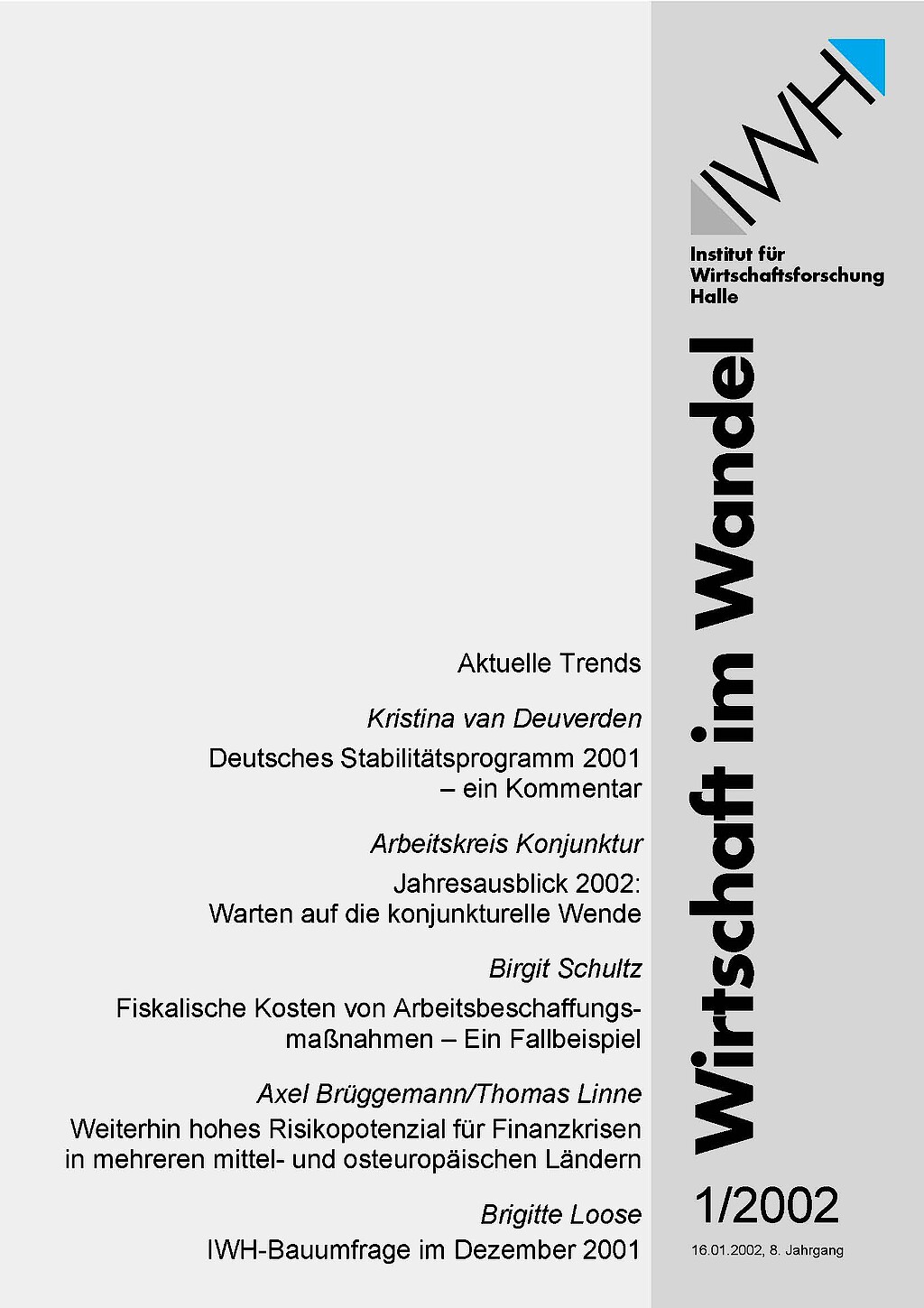Also in this issue

Current Trends - Share of students leaving school without having completed a basic degree has grown further
in: Wirtschaft im Wandel, No. 1, 2002
read publication
Fiscal costs of employment creating schemes - a case study
in: Wirtschaft im Wandel, No. 1, 2002
Abstract
Die Teilnahme an einer Arbeitsbeschaffungsmaßnahmen (ABM) verschlechtert bekanntermaßen die Beschäftigungschancen im regulären Arbeitsmarkt im Vergleich zur Nichtteilnahme. Dadurch kommt es nicht nur während der Durchführung der Maßnahme zu höheren fiskalischen Kosten im Vergleich zur Arbeitslosigkeit, sondern auch im Anschluss daran sind mehr öffentliche Mittel notwendig, um die im Durchschnitt verlängerte Arbeitslosigkeit zu finanzieren. In diesem Kontext konnten für ein Fallbeispiel Mehrkosten in Höhe von etwa 26 500 Euro ermittelt werden. Davon sind allein mehr als 60% Nachfolgekosten der Maßnahmenteilnahme. Sollte hingegen eine Maßnahme aus fiskalischer Sicht kostenneutral sein, so müsste sie die Arbeitslosigkeit im Fallbeispiel um 9,2 Monate verkürzen. Dies dürfte jedoch schwer zu erreichen sein, da während der ABM-Teilnahme kaum Übergänge in eine reguläre Beschäftigung zu beobachten sind, jedoch im Referenzszenario der Nichtteilnahme die Abgänge aus Arbeitslosigkeit in Beschäftigung in diesem Zeitraum relativ hoch sind. Eine strengere Ausrichtung auf Zielgruppen könnte hierbei möglicherweise Abhilfe schaffen.

IWH Construction Industry Survey December 2001: Companies skepticism remains high
in: Wirtschaft im Wandel, No. 1, 2002
read publication
Prospects for 2002: Waiting for the cyclical change
in: Wirtschaft im Wandel, No. 1, 2002
Abstract
Mit dem Jahresausblick für 2002 wird die ausführliche Konjunkturprognose von Mitte 2001 für das Jahr 2002 aktualisiert. Zu Beginn des Jahres 2002 gibt es nach sechs Quartalen Abschwung noch keine klaren Anzeichen für eine baldige Belebung der Konjunktur in Deutschland. Es fehlen Impulse aus dem Inland wie Ausland für eine schnelle Umkehr der abwärts gerichteten konjunkturellen Grundtendenz. In der Prognose wird davon ausgegangen, dass sich die US-Wirtschaft spätestens im Frühjahr aus der Rezession löst und Impulse auf die Weltwirtschaft aussendet. Dann wird sich auch in Deutschland und in der Eurozone insgesamt die Produktion beleben und in der zweiten Jahreshälfte an Schwung gewinnen. Der Anstieg der Exporte wird auf die Inlandsnachfrage ausstrahlen. Die Kräftigung der Konjunktur wird erst mit der üblichen Verzögerung am Arbeitsmarkt ankommen. Die expansiv ausgerichtete Geldpolitik wird ihre Wirkung voll entfalten. Die Finanzpolitik wird restriktiv wirken, da sie den Konsolidierungskurs verschärft.

Risk Potential for Financial Crises for the Central and East European Transition Countries still high
in: Wirtschaft im Wandel, No. 1, 2002
Abstract
Seit Mitte der neunziger Jahre brachen in den Ländern Mittel- und Osteuropas mehrere Finanzkrisen aus. Darunter waren mit Bulgarien, Rumänien und der Tschechischen Republik auch Länder, mit denen die EU Beitrittsverhandlungen führt. Die Krisenprävention ist nicht zuletzt wegen der Wachstumsverluste für die betroffenen Länder und der ökonomischen Ansteckungseffekte für die westeuropäischen Länder bedeutsam. Deshalb kommt einem Frühwarnsystem zur rechtzeitigen Erkennung von Krisenpotenzialen in den zukünftigen Mitgliedsländer eine hohe Bedeutung zu. Vor diesem Hintergrund führt das IWH regelmäßig Untersuchungen des Risikopotenzials für Finanzkrisen für ausgewählte mittel- und osteuropäischen Länder sowie für die Türkei und Russland durch. Seit Anfang 1999 lassen sich in den meisten Ländern dieser Region zwei unterschiedliche Phasen des Risikopotenzials unterscheiden. Im Zuge der Russlandkrise im August 1998 war in den mittel- und osteuropäischen Ländern aufgrund der Ansteckungs- und Übertragungseffekte durchgängig eine Zunahme des Risikopotenzials zu beobachten. Nach dem Auslaufen dieser Effekte reduzierte sich die Anfälligkeit in den meisten Ländern deutlich. Seit Mitte 2000 führte ein schwächeres außenwirtschaftliches Umfeld in der Mehrzahl der Länder zu einem erneuten Anstieg des Gefährdungspotenzials, der dringenden wirtschaftspolitischen Handlungsbedarf signalisiert.
Whom to contact
For Researchers

Head of Public Relations
If you have any further questions please contact me.
+49 345 7753-765 Request per E-MailFor Journalists

Head of Public Relations
If you have any further questions please contact me.
+49 345 7753-765 Request per E-Mail


